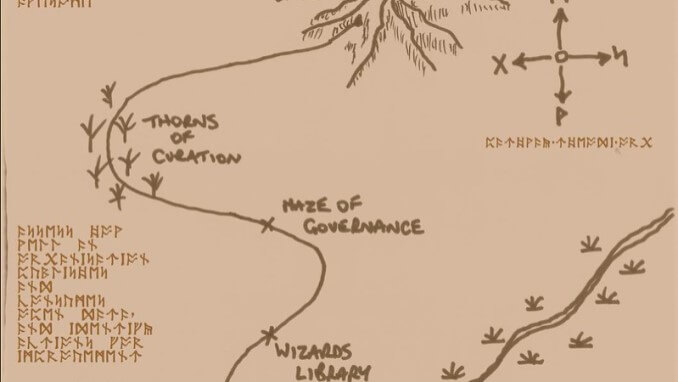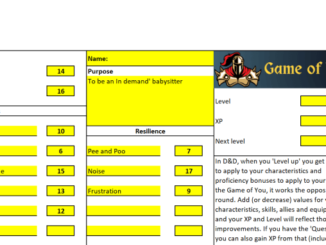
How role-playing games can help players unlock new learning about themselves
I sometimes like to counter the question ‘what can games teach?’ With ‘what can’t they teach?’. Jane McGonigal created a game to teach herself healthy behaviours for recovery from a serious brain injury, and that game has gone on to help thousands around the world improve their mental health and resilience. There’s anecdotal evidence to show that playing games has helped protestors to organise. Games have helped millions around the world find new ways to connect and socialise during a global pandemic.
Superbetter (the book) by Jane McGonigal is available on Amazon
One growing way for games to have a real impact on people’s development is the burgeoning use of tabletop role-playing games, particularly Dungeons & Dragons, for therapy. The Game to Grow non-profit ‘provides gaming groups for therapeutic, educational, and community growth’ and ‘promote awareness of the life-enriching potential of games across the world’.
Their flagship game is a roleplaying game of their own creation, developed after using Dungeons & Dragons for many years. The testimonials speak for themselves, with parents citing benefits from improved interaction skills to better impulse control to kids coming out of their shells. But the games they run are not just for children, and if we think through what role-playing games help people to learn and reflect on about themselves and their behaviours, it’s easy to see why.
Role-playing games set a stage for agency and exploration
In a game of Dungeons & Dragons, or a similar role-playing game, you create a character, through which you act. That avatar acts as a shield. You are not saying what you think or what you’d do, but what the character thinks or does. So you can try and test things, and connect with a viewpoint that may be different from your own.
With the help of the Dungeon Master or Games Master, you guide that character through a world of challenges: a space to test actions and consequences. A space where you can try things because any failure is game-based more than personal. A space where the challenges and journey mirror real-life things: you have to collaborate with the rest of the group and with some of the world’s inhabitants you meet along the way.
And you participate in a story arc, where your agency and your decisions result in your story beats. Any victory is yours, because you earned it. Anything more complex, including defeat, is yours to reflect on. And the game can raise all kinds of issues that you can be a part of: if a local village is engaged in an armed uprising against landowner taxes, whose side do you take? Why? What are the consequences, good and bad? And what does that say about you?
Real and relevant skills grow out of role-playing games

Whether your role-playing session is specifically a therapy session with a licensed therapist or not, if it’s a good session, this is likely to ask of you that you:
- Use social skills to persuade others and win them over
- Build and use esteem and confidence
- Co-operate and collaborate effectively to get results
- See things from others perspectives
- Take your turn and consider other players in the game
- Express yourself and your needs
- Creatively solve problems
And these skills don’t stay in the session. One participant in Megan A Connell’s Self-Rescuing Princess Girls’ Group said of a situation outside the session:
“I realized in the situation my character would not have said yes to this, so I decided to do what she would do, and I said no.”
The research is difficult, because every game of Dungeons & Dragons, or any other role-playing game, is individual – it’s hard to have a control and test group. But there is a growing body of research, and strong links have been found between role-playing and social skills, battling depression, moral development, suicide prevention, and a host of other positive effects.
Role-playing games can inspire learning game design of all stripes
This information is particularly useful if you’re somebody who could directly benefit from this, or a parent or carer of somebody who could. And with a positive psychology outlook, that shouldn’t be limited to those who are struggling. But what about learning game designers? What about educators, or L&D managers?
I think very little is as instructive as looking at what works well in one situation and asking how it can be adapted or learned from in another. If you’re looking to find, commission or design a solution that will help with some of the kinds of behaviours and skills listed, then look for something that works on some of the same levels. We can learn from how role-playing games:
- Encourage collaboration by making success contingent on it
- Set open challenges that players use creativity to solve
- Allow players to explore their identity by creating and playing another
- Bring about feelings that relate to real-life experiences, such as exaltation, challenge, uncertainty, empathy and others, and give space to explore them
- Allow agency and testing of actions and consequences
These are just a brief selection. In many ways, role-playing games are the most open and flexible games of all. Play isn’t limited by a programming language or the components supplied in the box. You’re limited only by your will and imagination.
This makes it a petri dish for what imagination can achieve – and where it excels, game designers and learning experience designers can and should learn from it. With the sheer amount that role-playing games can help unlock, the possibilities for players learning about themselves, and growing as people, are endless.
- Using Games to Sculpt Agency - 22nd November 2022
- Gift Horse Download - 25th April 2022
- Dungeons & Dragons & Development - 21st April 2022





Be the first to comment